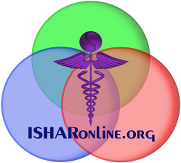Yoga > Psychological
List ISHAR Online Sources: Yoga > Psychological
Functional Summary
|
Modality |
|
Low-impact exercises combined with focus on breathing. Additional meditative aspects. |
|
Intention |
|
Traditionally, yoga seeks liberation by means of control over mind and body. In the contemporary west, it is used to decrease stress, acute anxiety and cortisol levels. |
|
Geo-Cultural |
|
Origins in the Indus Valley as early as 3300-1900 BCE. Introduction to the west in the mid-19th century. |
Topic Summary
From the Sanskrit word meaning “to join,” yoga practice has uncertain origins, but it is likely that major development occurred around the 5th and 6th centuries BCE as part of asceticism. The principle encompasses physical, mental, and spiritual aspects, and a variety of different schools. In the United States and Western Europe, the term “yoga” brings to mind the practices of Hatha yoga, which focuses on physical postures as exercise. Over the course of the mid to late 20th century and through the 21st century, yoga has increased in use in the US and other western nations.
Yoga has a number of health benefits including increased flexibility, strength, better breathing and posture, and reduction of stress. In fact, yoga is believed to be very beneficial for one’s mental health, as well as their physical health. Because of its focus on breath and body, as well as the tension relief brought about by many of the poses, general mental well-being is improved. Additionally, by regulating the body’s stress response system via relaxation, meditation, and exercise, yoga succeeds at lowering blood pressure and heart rate while improving respiration which help to fight against anxiety and depression. Teenagers are especially prone to mental health disorders, thus their practice of yoga has been effective at improving anger control, resilience, and mindfulness, all of which help prevent potential psychological conditions. The meditation aspect of yoga may also improve memory because it entails clearing your head of noise and focusing your mind. Finally, Hatha Yoga can potentially decrease the symptoms of Post-Traumatic Stress Disorder, even where the use of contemporary mental and pharmacological treatments have failed.
Research Summary
Many studies have been done on the stress relieving potential of yoga. One such study from 1995 looked at the potential stress reduction Sahaja yoga could provide for patients with epilepsy and found that it resulted in a significant positive change.
Research published in 2015 looked at patients with low distress tolerance who generally coped with stressful situations by overeating. After an 8-week twice-weekly yoga regiment, participants showed increased distress tolerance and decreased stress-eating compared to the control group.
Another study published in the same year found that yoga was an effective complementary treatment for women with post-partum depression. In fact, 78% of the women in the yoga group showed statistically significant improvement over the women in the control group.
Medical and psychological research studies require further testing in the areas of mechanisms and long-term impacts. A review of previous studies on Hatha yoga as a treatment for depression from 2010 encouraged continued research on the promising subject, but also critiqued several of the studies which had been performed for having some serious methodological errors, concluding that these should be considered preliminary evidence.
Perspectives
ISHAR strives to present all of our data in an impartial, informative manner. Nonetheless, there are always different viewpoints on various topics, and ISHAR encourages users to review the perspectives on other informational sites, then come to their own conclusions regarding what they consider the least biased. The sites below were chosen to represent a wide spectrum of approaches to this topic, and none are endorsed or promoted by ISHAR itself.
- Wikipedia: https://en.wikipedia.org/wiki/Yoga_as_exercise_or_alternative_medicine#H...
- WebMD:http://www.webmd.com/balance/guide/the-health-benefits-of-yoga
- A Pro-Practice Website:http://examinedexistence.com/the-five-mental-and-psychological-benefits-...
- An Anti-Practice Website: http://www.todayschristianwoman.com/articles/2005/march/truth-about-yoga...
